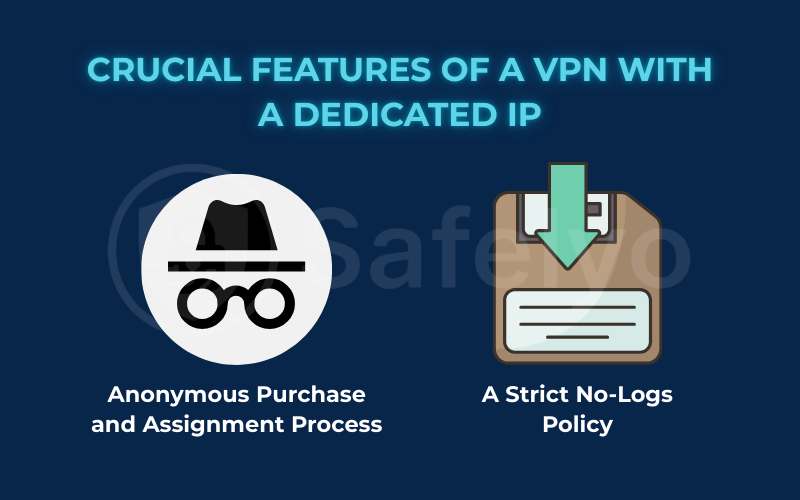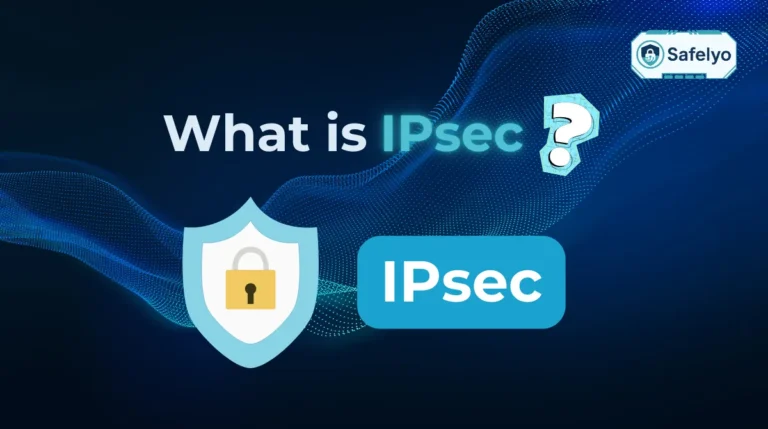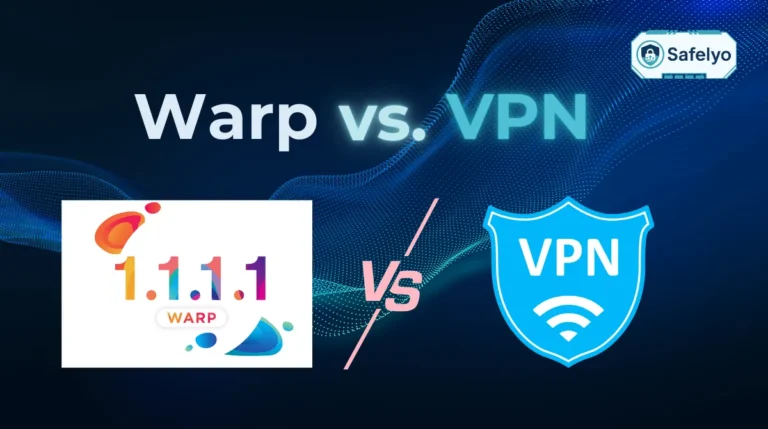When exploring VPN features, you’ll often see an add-on called a ‘dedicated IP’. To understand what is a dedicated IP, think of it as a private, unlisted phone number in a world of public payphones. But is it a necessary upgrade for your security, or just an expensive extra?
In today’s digital landscape, the type of IP address you use can significantly impact your online experience – from accessing your work network securely to simply avoiding endless CAPTCHA puzzles. The decision between a shared and dedicated IP goes beyond technical aspects; it can impact your convenience, security, and costs.
As a security analyst evaluating VPNs, I’ve seen many users overpay for a dedicated IP they don’t need. Others struggle with a shared IP when a dedicated one could solve their issues. The key is understanding the specific trade-offs.
In this comprehensive guide, you’ll discover:
- What a dedicated IP is, explained with a simple phone number analogy.
- The real-world benefits of remote work, banking, and gaming.
- The crucial privacy trade-offs you must consider.
- A quick quiz to help you decide if you actually need one.
Don’t guess when it comes to your digital identity. Let me help you demystify the dedicated IP and make the smartest choice for your needs.
1. What is a dedicated IP? What is a shared IP?
The world of IP addresses can feel overly technical, but I’ve found the easiest way to understand the difference is by thinking about phone numbers. It’s a simple analogy that perfectly captures the pros and cons of each type.
1.1. Shared IP (a public payphone)
A standard VPN connection gives you a shared IP. Think of this as using a public payphone on a busy street.
- Anonymity: You share the same phone number with hundreds of other people, making calls. This offers fantastic anonymity because your conversation is just one among many, making it nearly impossible to single you out.
- The Problem: If someone else uses that same payphone for prank calls (spamming, bot activity), that phone number might get blocked by businesses. The next time you try to make a call, it will be you who hears the busy signal. This is exactly what happens with IP blacklisting, which leads to those endless CAPTCHA puzzles and frustrating “access denied” messages.
1.2. Dedicated IP (your private cell phone number)
A dedicated IP is your very own private, unlisted cell phone number. Only you use it, and it never changes.
- The Consistency: You have a clean, consistent line of communication. You can give this number to trusted contacts (like your work’s IT department for remote access), and they’ll always know it’s you. You’ll never get blamed for someone else’s bad behavior, so your calls always go through.
- The Trade-off: Your activity is tied to this one, unique number. While your calls are still encrypted and secure, it’s inherently less anonymous than being lost in the crowd of a public payphone.
1.3. Static IP vs. Dedicated IP?
This is a common point of confusion. “Static” simply means the number doesn’t change. A dedicated IP is a type of static IP, but with the added promise that it’s exclusively yours. All dedicated IPs are static, but not all static IPs are dedicated (some could be shared by a small group). When you buy a VPN with a dedicated IP, you’re getting both: A number that doesn’t change and is for your use only.
Here’s a quick summary of the dedicated IP vs shared IP differences:
| Feature | Shared IP (Public Payphone) |
Dedicated IP (Private Cell Phone) |
|---|---|---|
| Exclusivity | Used by hundreds or thousands of users. | Used only by you. |
| Anonymity | Very high. Your activity is blended in with everyone else’s. | Lower. Your activity is tied to a single, unique IP address. |
| Reputation | Can be poor. Prone to blacklists and CAPTCHA. | Clean and consistent. You control the reputation. |
| Accessibility | May be blocked by sensitive services (work networks, banking). | Excellent. Can be whitelisted for secure access. |
| Cost | Included in a standard VPN plan. | Requires an additional fee. |
2. Quiz: Do you really need a dedicated IP?
The single most common question I get is, “Do I need a dedicated IP?” The honest answer is: Most people don’t. A standard, high-quality shared IP VPN is perfect for general privacy and streaming. But for a specific group of users, a dedicated IP address isn’t just a luxury – it’s a necessity.
To help you decide, I’ve created this simple five-question quiz. It’s the same checklist I run through in my head when someone asks for my advice. Check the box that best describes your situation to see if a dedicated IP is a smart investment for you.
| Question | Yes | No |
| 1. Do you frequently access a work network, private server, or home security system while using a VPN? | ☐ | ☐ |
| 2. Do you use online banking or trade on cryptocurrency exchanges that are highly sensitive to IP address changes? | ☐ | ☐ |
| 3. Are you constantly annoyed by having to solve CAPTCHA puzzles (“I’m not a robot”) or getting blocked by websites when your VPN is on? | ☐ | ☐ |
| 4. Do you host a personal website, a game server for friends, or need stable remote access to home devices like a Plex media server? | ☐ | ☐ |
| 5. Is your #1 priority to blend in with the largest possible crowd for maximum, untraceable anonymity? | ☐ | ☐ |
If you checked Yes to any of the questions 1-4
You are the ideal candidate for a dedicated IP. The benefits you’ll gain in stability, security, and convenience will almost certainly outweigh the extra cost. You’ll spend less time dealing with lockouts and verification prompts and more time being productive.
If you checked 'Yes' mainly to question 5 (and 'No' to the others)
A shared IP is actually better for your primary goal. The “public payphone” approach, where your traffic is mixed with that of many others, offers a higher degree of anonymity. A standard VPN plan is the perfect fit for you.
3. The benefits of a dedicated IP (when to use)
If our quiz pointed you toward a dedicated IP, you’re likely facing one of the specific challenges where a shared IP address causes more problems than it solves. Let’s explore the real-world benefits of a dedicated IP and see exactly how it can make your online life smoother and more secure.
3.1. Secure remote access
This is perhaps the most common professional use case I encounter. Many companies enhance their security by creating an “allowlist” (or whitelist) of approved IP addresses that can access their internal network, servers, or cloud services. Trying to log in from a constantly changing shared IP is a recipe for frustration, as you’ll be blocked every time. A dedicated IP for remote access is the perfect solution. Your system administrator can add your single, static IP to the allowlist, granting you secure and stable access without triggering constant security alerts.
3.2. Stable online banking and crypto trading
Financial institutions are on high alert for suspicious activity. If you log into your bank account from a New York IP one day, then a London IP the next, it may trigger a fraud alert. This can potentially freeze your account. I’ve personally had this happen while testing VPNs. Using a dedicated IP for online banking means the bank recognizes you logging in from the same trusted address each time. This drastically reduces the risk of lockouts and makes transactions smoother.
3.3. Avoid blacklists and CAPTCHA
This is the “public payphone” problem in action. If even one person on a shared IP uses it for spam, that IP address gets blacklisted across the web. Suddenly, you’re the one who can’t access certain websites and has to prove you’re not a robot every five minutes. Since you are the only one using your dedicated IP, its reputation is pristine. This means fewer annoying CAPTCHA checks and a much lower chance of being blocked by services like Netflix or Amazon that actively hunt for overused VPN IPs.
3.4. Easier server and device access
If you’re tech-savvy and host a personal website or a game server for friends, a dedicated IP is invaluable. It’s also beneficial for smart home devices like Plex media servers or security cameras. It gives you a stable, predictable address to connect to from anywhere in the world, simplifying network management and making your self-hosted services much more reliable and secure.

4. The privacy trade-off: Is a dedicated IP less private?
This is the critical question, and it deserves a straight answer: Yes, in theory, a dedicated IP is less private than a shared IP. It’s the fundamental trade-off you make for the convenience and stability it provides.
Let me explain exactly why. With a shared IP, your internet traffic is one stream among hundreds, or even thousands, originating from the same IP address. This creates a powerful “hiding in the crowd” effect, making it extremely difficult for anyone to isolate your specific activity.
With a dedicated IP, all your encrypted VPN traffic originates from a single, unique IP address that is assigned only to you. This means your online activity, while still protected by the VPN’s encryption, is no longer mixed with others. The question “Is a dedicated IP less private?” boils down to this lack of a crowd to blend into.
However, this is just the beginning of the story. Reputable VPN providers understand this trade-off and have implemented robust systems to mitigate the risk.
How the best VPNs protect your privacy
When I evaluate a two crucial features, I look for two crucial features that break the chain of identity:
- Anonymous Purchase and Assignment Process: The best providers go a step further. For instance, the NordVPN dedicated IP system uses a token-based method. You purchase the feature, receive a unique token, and then use that token to activate your IP. This process is designed so that even the company itself cannot link your user account directly to the dedicated IP you are assigned. Your identity is decoupled from the IP address from the very beginning.
- A Strict No-Logs Policy: This is non-negotiable and the most important factor. Even though the IP address is yours, a top-tier VPN provider like NordVPN or Surfshark keeps no records of what you do while connected. They don’t log your browsing history, connection times, or bandwidth usage. So, even if someone were to identify the IP, there would be no data trail leading back to your activity.

>> Check out the best no-log VPN in 2025 (only proven & audited services)
The bottom line
While a shared IP offers superior “crowd-based” anonymity, a dedicated IP from a trusted, audited, no-logs VPN provider is still an extremely secure and private way to browse the internet. You are trading one form of anonymity for a host of practical benefits, but you are not sacrificing your fundamental right to encrypted, unmonitored internet access.
5. The best VPNs with dedicated IP support in 2025
Once you’ve decided a dedicated IP is right for you, the next step is choosing the right provider. While many VPNs claim to offer this feature, the quality, implementation, and price can vary significantly. I’ve tested the leading services, and these are my top picks based on location variety, privacy implementation, and overall value.
Remember, a dedicated IP is almost always a paid add-on to a standard VPN subscription.
| VPN Provider | Dedicated IP Price (Add-on) | Available Locations | Purchase & Assignment Process |
|---|---|---|---|
| NordVPN | ~$4 – $5 / month | 10+ countries (including the US, UK, Germany, Netherlands) | Anonymous Token-Based: The most private method available, decoupling your account from the IP. |
| Surfshark | ~$3 – $4 / month | 5+ countries (including the US, UK, Germany) | Standard: Your dedicated IP is linked directly to your Surfshark account. |
| CyberGhost | ~$3 – $4 / month | 5+ countries (including the US, UK, Germany, and France) | Anonymous Token-Based: Similar to NordVPN, offering excellent privacy protection. |
| Private Internet Access | ~$3 – $4 / month | 5+ countries (including the US, UK, Canada, Australia) | Standard: The IP is linked to your user account. |
Our top picks explained:
- NordVPN: In my opinion, the NordVPN dedicated IP system offers the best overall package. It has a wide selection of countries and, most importantly, its anonymous token-based system is the gold standard for privacy. It’s the one I’d recommend to anyone who is serious about both the convenience of a dedicated IP and the core principles of anonymity.
- Surfshark: The Surfshark dedicated IP is an excellent, budget-friendly choice. While its assignment process is standard, Surfshark’s core service is audited, maintains a strict no-logs policy, and offers great performance. If you need a dedicated IP in one of its supported locations and want to save a few dollars, it’s a fantastic option.
- CyberGhost: CyberGhost is another strong contender that uses a privacy-focused token system. It’s very user-friendly and a great choice for those who might be less tech-savvy but still want the benefits and privacy of a dedicated IP.
6. FAQ about dedicated IP
We’ve gone over the details, but you may still have some specific questions. Here are quick, direct answers to the most common queries about dedicated IPs.
What is a dedicated IP?
A dedicated IP is a unique and static Internet Protocol (IP) address assigned exclusively to you, ensuring that it is not shared with anyone else. Unlike a shared IP on a standard VPN, which is used by hundreds of other users, a dedicated IP address is exclusively yours. This provides a stable and consistent online identity, enhancing privacy and reliability.
Why would I want a dedicated IP address?
You would want a dedicated IP for specific tasks where consistency and a clean reputation are important. The primary reasons include secure remote access to work networks, stable online banking and crypto trading, avoiding constant CAPTCHA verifications, and hosting personal servers for gaming or media.
Is a dedicated IP the same as a VPN?
No, they are different things that work together. A VPN (Virtual Private Network) is a service that encrypts your internet connection. It routes your data through a secure server, ensuring your online activities remain private and protected from prying eyes. A dedicated IP is an optional, premium feature of a VPN that gives you an exclusive IP address at the end of that secure tunnel.
Do I still get the security of a VPN with a dedicated IP?
Yes, absolutely. All your internet traffic is still fully encrypted and routed through the secure VPN server. The core security and privacy benefits of the VPN remain active. The only thing that changes is that the final IP address is unique to you instead of being shared.
How is a VPN with a dedicated IP different from a business VPN?
A dedicated IP is typically a feature for a single user looking for stability. A business VPN is a comprehensive security solution designed for an entire team or company. It often includes features like a dedicated server for the whole organization, centralized user management, and specific access controls.
Do I need a dedicated IP for my website?
If you are using shared web hosting, you likely share an IP with other websites. A dedicated IP for your website can improve security (by isolating you from other sites’ issues), help with email deliverability, and is sometimes required for specific e-commerce or third-party applications.
Can I use my dedicated IP on all my devices?
Yes. As long as your VPN plan allows for multiple simultaneous connections, you can install and connect the VPN on your phone, laptop, and other devices. When connected to the VPN, all users will share the same single dedicated IP address, allowing them to appear as if they are accessing the internet from the same location while still benefiting from the VPN’s encryption and security features.
Can I choose the city for my dedicated IP?
You can typically choose the country from a list provided by the VPN service (e.g., US, UK, Germany). However, the specific city within that country is usually assigned by the provider and cannot be chosen.
7. Conclusion
A dedicated IP is a powerful tool, but it’s not for everyone. It’s a specialized solution designed to solve a specific set of problems related to stability, access, and online reputation.
- A dedicated IP is your exclusive address on the internet, while a shared IP is used by many.
- It’s ideal for secure remote access, stable online banking, crypto trading, and avoiding annoying CAPTCHA.
- The main trade-off is slightly less anonymity, but this is mitigated by a strong no-logs VPN.
- Run our quiz to see if the benefits outweigh the extra cost for your specific needs.
Don’t pay for a feature you don’t need. If you’re a casual user seeking maximum privacy by blending in with a crowd, a shared IP is perfect. But if you’re facing the specific challenges we’ve outlined, a dedicated IP is a worthwhile investment in a smoother, more secure online experience.
Whether you need a shared or dedicated IP, choosing a trustworthy provider is key. Explore the in-depth reviews of the best VPNs in our Privacy & Security Basics section to find the service that’s right for you with Safelyo.













